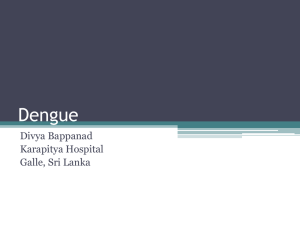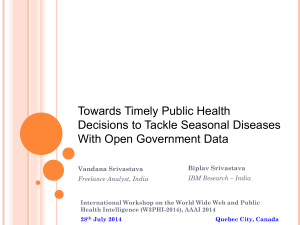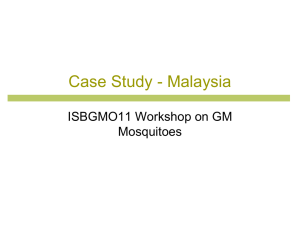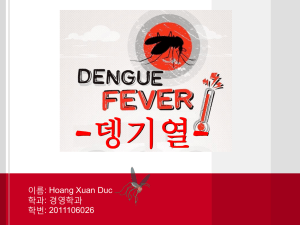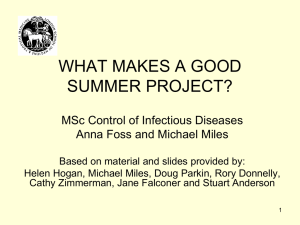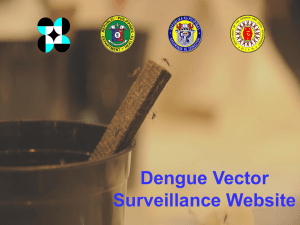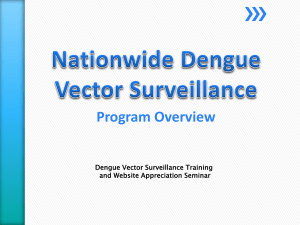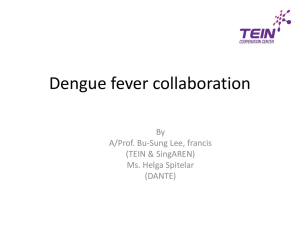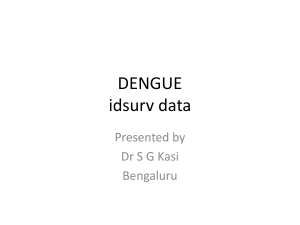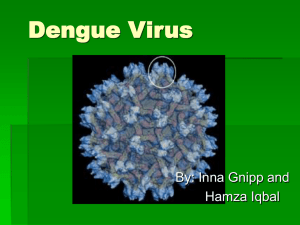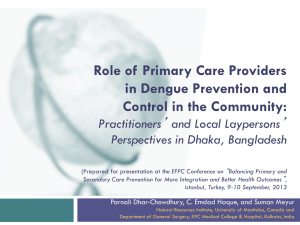Dengue Show without movie
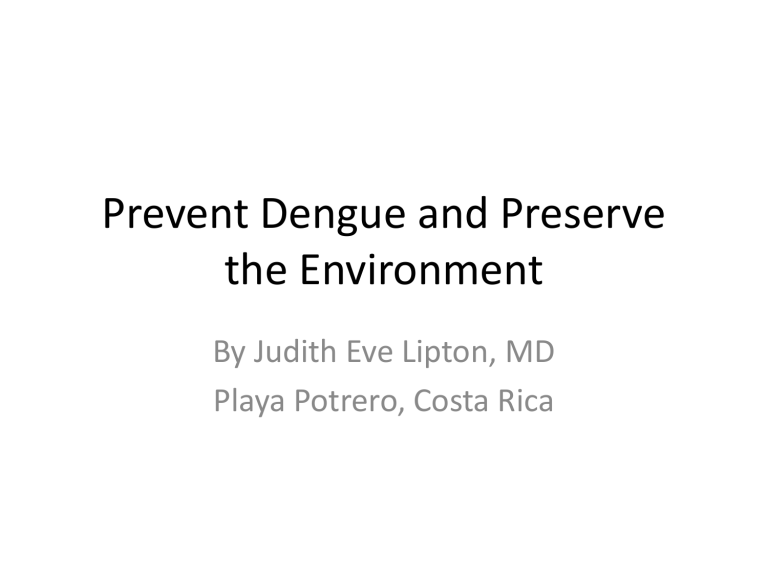
Prevent Dengue and Preserve the Environment
By Judith Eve Lipton, MD
Playa Potrero, Costa Rica
What is Dengue Fever?
• Dengue Fever is a viral disease that affects people all over the world.
• It is caused by an arbovirus that is transmitted by the bite of a certain species of mosquito.
• Only people get Dengue Fever, and only one genus of mosquito carries it. Therefore it may be considered to be a contagious disease with a mosquito vector.
What does all that mean?
• What is a virus? A virus is a small package of
DNA or RNA that cannot live by itself.
• A virus hijacks other cells, and makes them make new viruses.
• An “arbovirus” is an “arthropod transmitted virus.”
• An arthropod is an animal which has an external skeleton, a jointed body, and jointed legs. A mosquito, flea, or tick.
What is a vector?
A Vector is something that carries things:
Aedes aegypti
Our Enemy! The Vector!
Look at those stripes:
Aedes aegypti
How about Dengue?
• Dengue Fever is caused by a virus that contains RNA.
• It is spread from mosquitos to people and back again.
• No other animals get Dengue Fever.
• The name of the mosquito is Aedes aegypti
• More than 15,000 people got Dengue Fever in
Costa Rica in 2012.
Aedes aegypti in Costa Rica
• A campaign to eradicate Aedes aegypti began in 1948
• Costa Rica was declared free of Aa in 1961
• It came back in 1971 in Puntarenas, and was eliminated in 1973
• The country was free of Aa in 1987
• The Aedes mosquitos came back in 1992, and have been present ever since.
Dengue is Spreading Fast
Dengue has increased 300% since
1960. Why?
Increased population
Increased urbanization
Increased international travel
Global warming
How Dengue Spreads
Guanacaste is hit hard
• There are 400% more cases of Dengue Fever in Guanacaste now than in 2009.
• Normal community programs of spraying and fumigation have not worked.
• Random spraying and fogging kill animals that eat mosquitos.
• We need new methods to prevent Dengue.
What does Dengue Feel Like?
• “Bone break fever” – the worst pain you have ever felt in your whole life, all over your body
• High fever
• Severe headache
• A Rash
• Vomiting and diarrhea
• For 2-7 days. No fun at all!
• This occurs 4-10 days after the mosquito bite
Can it get worse? YES!
• Dengue Hemorrhagic Fever can be fatal.
• It includes all of the pain and problems as regular
Dengue, plus
• Easy bruising
• Low platelets (blood cells that cause clotting)
• Low blood pressure, drowsiness
• Difficulty breathing
• Organ Failure
• Swelling in arms, legs, brain, and belly
How does a Doctor Diagnose Dengue?
Clinical Signs of Dengue Are:
High Fever
Pain all over
Low white blood cell count
High hematocrit (red blood cells) +low platelets
(clotting cells)
Vomiting, liver enlargement
Rash
Sleepiness or restlessness
Swelling in the feet and hands
How does a doctor prove Dengue?
To prove a person has Dengue Fever, a laboratory has to analyze blood.
Low platelets, high hematocrit, and low white blood cell count are easy tests
Elevated IgG and IgM are important
But PCR (polymerase chain reaction), viral antibodies and specific antibodies (ELISA) are proof.
In Costa Rica, Dengue Must Be Proven and Reported
According to the Health Department, anybody with signs of Dengue Fever should have blood tests, including serotyping.
The blood tests may be gotten at private clinics or the EBAIS clinics in Brasilito or Matapalo
Just platelets or a low white count are not enough
Serotyping or PCR are necessary
The government of Costa Rica has the means to do these important tests.
Antibodies don’t show up until after
Day 5, but they can be measured even weeks after a Dengue infection.
Dengue is a Reportable Disease, like TB or AIDS
Why?
Because it is spread from infected mosquitos to healthy people, and then from infected people to healthy mosquitos.
People and mosquitos are the problem!
Treatment of Dengue
Rest, indoors, in a place with good screens
Fluids, hydration
Tylenol or tramadol are ok for pain
Aspirin, Motrin, Aleve and other NSAIDS are not ok.
“NSAIDS” are non-steroidal anti-inflammatory drugs. They inhibit blood clotting and may make
Dengue worse.
Go to the hospital if
• You are getting very dizzy or have severe headaches
• You are bleeding
• Your urine decreases a lot
• Your behavior changes dramatically
What can we do?
Protect our bodies
Protect our homes
Kill the baby mosquitos
Kill the adults if we can
Protect the animals that eat mosquitos or mosquito babies
Protect our bodies
• Aedes aegypti mosquitos feed at dawn and dusk. Stay indoors in well screened areas at these times.
• Wear long sleeved shirts and pants and socks
• Consider using DEET, citronella, soy oil or other chemical repellants
• Consider buying mosquito repellant clothing with DEET or permethrin
Extreme Mosquito Protective Clothing
A little more attractive clothing
Types of DEET
Natural Repellants
Stop the females
Where do Aedes live?
Protect our Homes
• Female mosquitos like to lay their eggs in fresh water inside houses. They like dog bowls, fish tanks, flower pots, and toilets.
• Go through your house and remove every single thing that collects water.
• Empty your pet dishes every day and give them fresh water
• Fix the screens, or add new ones
Protect our Beds
Screens can be beautiful
Kill the Larvae with Oil
Baby Mosquitos Breath through a
Snorkel
A tiny drop of oil clogs the snorkel
Kill the larvae in standing water:
All you need is a little cooking oil
Mosquito Dunks Kill Larvae made with Bt-israelensis a bacteria harmless to the environment
Cherish Animals that Eat Mosquitos!
Like Hummingbirds!
Frogs and Toads
Bats
Geckos
Look Carefully at this Gecko
Eating a Mosquito
Dragonflies
Mosquito Fish
Protect our Yards
Eliminate all standing water.
Do not leave buckets of water outside for pets
Consider eliminating ponds or fountains
Put plenty of chlorine in swimming pools, especially in rainy season
Do not allow old tires or other junk in the yard.
What does not work
• No specific vaccines yet
• No specific anti-virals yet
• Broadcast fumigation causes a short drop in numbers of mosquitos, but increased numbers later because natural predators are killed.
• Spraying indoor walls does not work, because the mosquito larvae live in water.
Dengue Resources
•
• Dr. Warren Chavarria, Ministerio de Salud, Santa Cruz, Guanacaste
– 2680 0160, wchavarria@medicos.cr
• Pan-American Health Organization: Calle 16, Avenida 6 y 8, Distrito Hospital, San José,
Costa Rica
Apartado 3745, San José, Costa Rica
• Tel.: +506 2521-7045 | +506 2258-5810
• Fax: 2258-5830 www.cor.ops-oms.org
•
• e-mail@cor.ops-oms.org
• Dr. Jose San Martin: Director, Dengue Program, PAHO: sanmartj@paho.org
• Regional Office for the Americas of the World Health Organization:
525 Twenty-third Street, N.W., Washington, D.C. 20037, United States of America
•
• Tel.: +1 (202) 974-3000 Fax: +1 (202) 974-3663
• Dengue Program Link: http://new.paho.org/hq/index.php?option=com_content&view=category&layout=blog&id=9
01&Itemid=3526&lang=en -
• Centers for Disease Control, Dengue Page and MAP: http://www.cdc.gov/dengue/
• World Health Organization, Dengue Page: http://www.who.int/topics/dengue/en/
